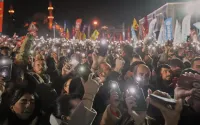Common Dreams / Published on Thursday, November 10, 2005 by Inter Press ServiceThalif Deen
Six countries -- the United States, Britain, Canada, France, Sweden and Kyrgyzstan -- have been singled out for violating international human rights conventions by deporting terrorist suspects to countries such as Egypt, Syria, Algeria and Uzbekistan, where they may have been tortured.
The charges, which come at a time when the U.S. Central Intelligence Agency (CIA) is accused of running secret detention centers overseas, have been catalogued in a 15-page U.N. report presented to the 191-member General Assembly by Manfred Nowak, a special rapporteur on torture.
"Several governments, in the fight against terrorism, have transferred or proposed to return alleged terrorist suspects to countries where they may be at risk of torture or ill-treatment," says the report titled "Torture and other Cruel, Inhuman or Degrading Treatment or Punishment".
The study cites Article 3 of the U.N. Convention Against Torture, which says "clearly and unequivocally" that "No State party shall expel, return ('refouler') or extradite a person to another State where there are substantial grounds for believing that he would be danger of being subjected to torture."
The practice of deportation has been strongly criticized by several human rights groups, including Amnesty International and Human Rights Watch.
But countries such as the United States and Sweden have justified the extradition on the ground that countries receiving the deportees have given "diplomatic assurances or formal guarantees" that there will be no torture, ill-treatment or the death penalty.
But according to Nowak, "diplomatic assurances are unreliable and ineffective in the protection against torture and ill-treatment and such assurances are sought usually from States where the practice of torture is systematic".
He also points out that diplomatic assurances are not legally binding. "Therefore they carry no legal effect and no accountability, if breached, and the person whom the assurances aim to protect has no recourse if the assurances are violated."
In a separate report titled "Protecting Human Rights and Fundamental Freedoms while Countering Terrorism", U.N. Secretary-General Kofi Annan pointedly says that "while States have the duty to protect their citizens against terrorism, counter-terrorist measures must be in conformity with international human rights, humanitarian and refugee law".
"The Secretary-General, the High Commissioner for Human Rights, and many human rights experts continue to express concern that many counter-terrorism measures are infringing on human rights and fundamental freedoms," the report warns.
Both U.N. reports are currently before the General Assembly's Third Committee dealing with social, humanitarian and cultural issues.
Mouin Rabbani, contributing editor to the Washington-based Middle East Report, concurs with the arguments by U.N. officials and human rights experts condemning the deportation of terrorist suspects.
"The conclusions of the new U.N. Report and concerns expressed in it strike me as entirely warranted, all the more so because there is concrete and indisputable evidence from recent cases to demonstrate the validity of the report's conclusions and concerns, as well as evidence that intelligence personnel from the rendering countries play a role in such interrogations and procedures," he told IPS.
Why are so-called "renditions" employed in the first place? Rabanni asked. "It seems to me that in many, and probably most cases, the reasoning behind them is quite simple: governments in countries resorting to renditions are unable to demonstrate the validity of their claims and suspicions against suspects to the satisfaction of national courts, or to do so while observing laws that guarantee due process that may be upheld by these courts," he said.
Or, he argued, governments may have other reasons to deport undesired individuals, to whom they previously granted asylum, back to their countries of origin.
The purpose is thus to exploit what is often the tenuous residency status of rendered individuals to permit the courts and security forces in countries of origin to "sort them out" -- to use more robust interrogation techniques like physical torture and credible threats against loved ones to extract punishable confessions or apply emergency laws to put them behind bars without the inconvenience of due process, he said.
"An added benefit is that all this tends to take place far away from the limelight of publicity, in environments where media and access are typically strictly controlled or forbidden entirely," Rabbani told IPS.
Francis A. Boyle, professor of international law at the University of Illinois College of Law, is particularly critical of the policies of the administration of President George W. Bush -- specifically on renditions.
He condemned the "reprehensive policy known euphemistically as 'extraordinary renditions'" that involve both the "enforced disappearances of persons" and torture, as being "widespread" and "systematic."
Such acts, Boyle told IPS, constitute a "crime against humanity" as defined by Article 7 of the Rome Statute for the International Criminal Court (ICC).
"That is precisely why the Bush Jr. administration has done everything humanly possible to sabotage the ICC," he added.
To the contrary, Boyle argued, everyone in the chain of command responsible for this criminal policy -- from Bush down through Vice President Dick Cheney, National Intelligence Director John Negroponte, CIA Director Porter Goss and operatives at the Clandestine Services Unit of the CIA -- "must be prosecuted under both U.S. domestic criminal law, international criminal law, and the domestic criminal legal systems of every state in the world".
Boyle also pointed out that there is no statute of limitations for such grievous international crimes.
"Furthermore, all Bush Jr. administration lawyers at the White House, the Department of Justice, and the CIA, inter alia, who signed off on 'extraordinary renditions' must also be prosecuted for aiding and abetting crimes against humanity, war crimes, torture, enforced disappearances, murder, and kidnapping, " said Boyle, the author of "Destroying World Order" (2005) and "Biowarfare and Terrorism" (2005).
He said that Italy is correctly starting to do this. Other states are obligated to follow under basic principles of both treaty and customary international law, Boyle added.
Rabbani dismissed the so-called diplomatic assurances on deportations as "largely meaningless".
"In reality, this is Guantanamo Bay (the U.S. detention facility for terror suspects in Cuba) on a global scale."
Rabbani said there is no persuasive explanation of why else renditions have in the past several years become a weapon of choice for officials who have demonstrated a total contempt for the rule of law, and have very publicly indicated their determination to leapfrog restrictions, such as the Geneva Conventions and longstanding protections of civil liberties, on their handling of suspects.
"Why else governments would willingly deport suspects they claim pose serious threats to their own national security, is beyond me," Rabbani added.






